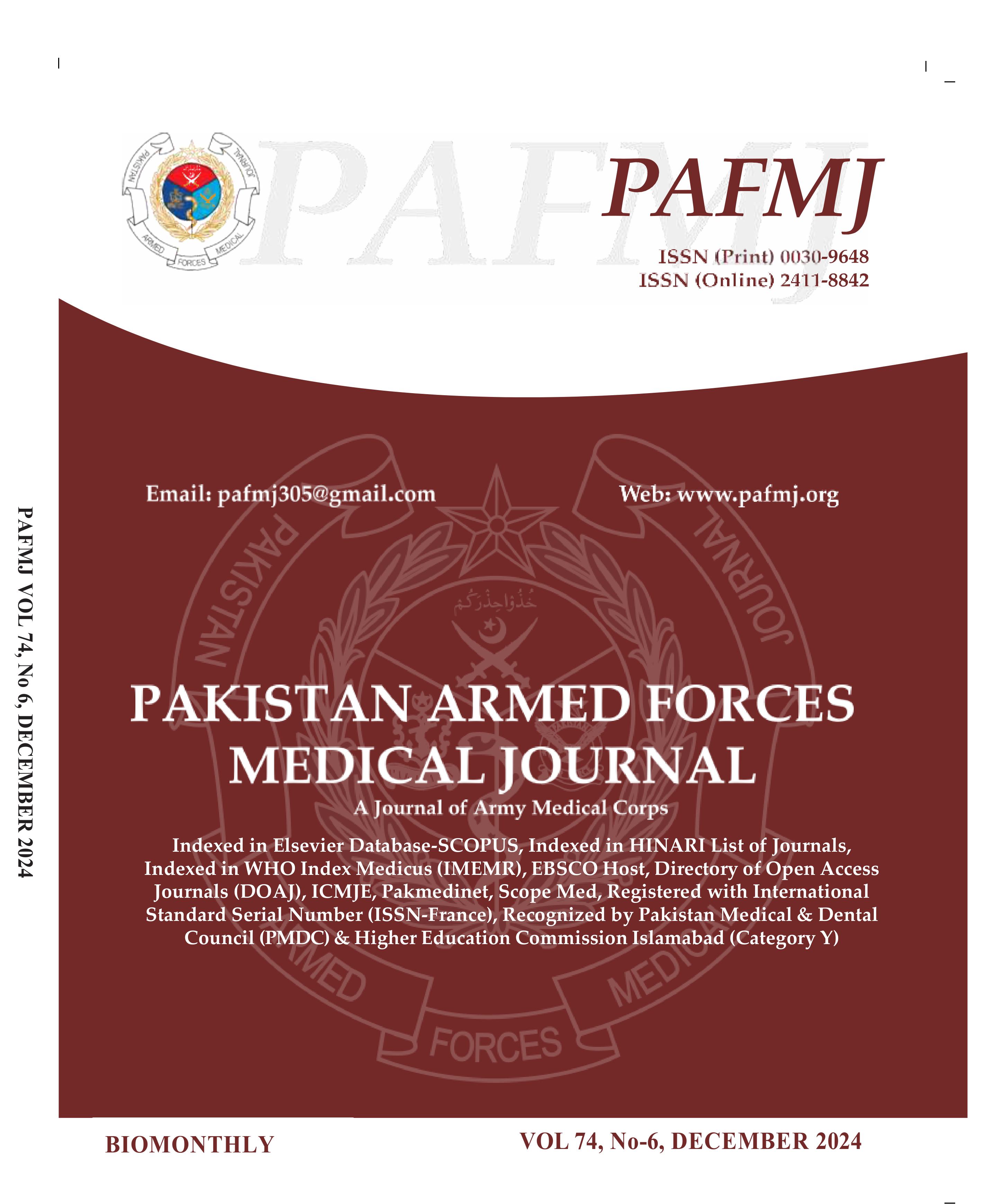Evaluation of the Role of Losartan in the Prevention of Benign Prostate Hyperplasia in Rats
DOI:
https://doi.org/10.51253/pafmj.v74i6.10693Keywords:
Benign prostatic hyperplasia, Losartan, Prostatic index.Abstract
Objective: To evaluate the preventive role of Losartan in testosterone-induced Benign Prostate Hyperplasia in an adult rat model.
Study Design: Laboratory-based experimental study.
Place and Duration of Study: National Institute for Health, Islamabad Pakistan, for four weeks in Oct 2021.
Methodology: A total of ninety (n=90) rats were divided into three equal Groups, having thirty rats each. In group-A, no active intervention was carried out. In groups B and C, subcutaneous injections of testosterone were administered daily for 28 days to induce a Benign Prostate Hyperplasia model. In group-C, Losartan was administered daily. Animals were sacrificed after the study period of 4 weeks. The animal and prostatic weights were measured to calculate the prostatic index. Blood samples were taken to assess Prostate-Specific Antigen levels, and prostate samples were preserved for histo-pathological analysis.
Results: Mean prostatic weight, prostatic index and serum Prostate-Specific Antigen showed a statistically significant decrease in group-C, where Losartan was given, compared to the disease control group-B (p-value <0.001). Moreover, histo-pathological features like glandular and stromal hyperplasia and the formation of intra-luminal papillary folds were significantly reduced in the drug-treated group-C compared to group-B.
Conclusion: Losartan is an effective drug for the prevention of Benign Prostate Hyperplasia.
Downloads
References
Cannarella R, Condorelli RA, Barbagallo F, La Vignera S, Calogero AE. Endocrinology of the aging prostate: current concepts. Frontiers in Endocrinology 2021; 12: 554078.
https://doi.org/10.3389/fendo.2021.554078
Lee SW, Chan EM, Lai YK. The global burden of lower urinary tract symptoms suggestive of benign prostatic hyperplasia: a systematic review and meta-analysis. Sci Rep 2017; 7(1): 6628.
https://doi.org/10.1038/s41598-017-06628-8
Vafa A, Afzal SM, Barnwal P, Rashid S, Shahid A, Alpashree, et al. Protective role of diosmin against testosterone propionate-induced prostatic hyperplasia in Wistar rats: Plausible role of oxidative stress and inflammation. Human Exp Toxicol 2020; 39(9): 1133-1146. https://doi.org/10.1177/0960327119889655
Mostafa F, Mantawy EM, Azab SS, El-Demerdash E. The angiotensin converting enzyme inhibitor captopril attenuates testosterone-induced benign prostatic hyperplasia in rats; a mechanistic approach. Eur J Pharmacol 2019; 865: 172729.
https://doi.org/10.1016/j.ejphar.2019.172729
Hunyady L, Catt KJ. Pleiotropic AT1 receptor signaling pathways mediating physiological and pathogenic actions of angiotensin II. Mol Endocrinol 2019; 20(5): 953-970.
https://doi.org/10.1210/me.2004-0536
Lokeshwar SD, Harper BT, Webb E, Jordan A, Dykes TA, Neal Jr DE, et al. Epidemiology and treatment modalities for the management of benign prostatic hyperplasia. Translat Androl Urol 2019; 8(5): 529. https://doi.org/10.21037/tau.2019.10.01
Leung SKW, McNeill SA. Therapeutic Options for Benign Prostate Hyperplasia (BPH) and Prostatic Cancer. In: Schill WB, Comhaire F, Hargreave TB. (eds) Andrology for the Clinician. Springer, Berlin, Heidelberg; 2006.
https://doi.org/10.1007/3-540-33713-X_91
Adaramoye OA, Oladipo TD, Akanni OO, Abiola OJ. Hexane fraction of Annona muricata (Sour sop) seed ameliorates testosterone-induced benign prostatic hyperplasia in rats. Biomed Pharmacother 2019; 111: 403-413.
https://doi.org/10.1016/j.biopha.2018.12.038
Bjerre HL, Christensen JB, Buus NH, Simonsen U, Su J. The role of aliskiren in the management of hypertension and major cardiovascular outcomes: a systematic review and meta-analysis. J Human Hypertens 2019; 33(11): 795-806.
https://doi.org/10.1038/s41371-018-0149-8
Ozhan O, Parlakpinar H, Acet A. Comparison of the effects of losartan, captopril, angiotensin II type 2 receptor agonist compound 21, and MAS receptor agonist AVE 0991 on myocardial ischemia–reperfusion necrosis in rats. Fundament Clin Pharmacol 2021; 35(4): 669-680.
https://doi.org/10.1111/fcp.12599
Vásquez‐Velásquez C, Gasco M, Fano-Sizgorich D, Gonzales GF. Inflammatory pathway employed by Red Maca to treat induced benign prostatic hyperplasia in rats. Andrologia 2020; 52(3): e13516.
https://doi.org/10.1111/and.13516
de Assis AM, Moreira AM, Carnevale FC, Marcelino AS, de Oliveira Cerri LM, Antunes AA, et al. Effects of prostatic artery embolization on the dynamic component of benign prostate hyperplasia as assessed by ultrasound elastography: a pilot series. Cardiovasc Intervent Radiol 2019; 42(7): 1001-1007.
https://doi.org/10.1007/s00270-019-02220-x
Golchin-Rad K, Mogheiseh A, Nazifi S, Khafi MS, Derakhshandeh N, Abbaszadeh-Hasiri M. Changes in the serum prostatic biomarkers during the treatment of benign prostatic hyperplasia with a 5alpha-reductase inhibitor: finasteride. Top Companion Animal Med 2020; 38: 100405.
https://doi.org/10.1016/j.tcam.2020.100405
Zhang J, Zhang M, Tang J, Yin G, Long Z, He L, et al. Animal models of benign prostatic hyperplasia. Prostate Cancer Prostatic Dis 2021; 24(1): 49-57.
https://doi.org/10.1038/s41391-020-00277-1
Jeon WY, Kim OS, Seo CS, Jin SE, Kim J, Shin HK, et al. Inhibitory effects of Ponciri Fructus on testosterone-induced benign prostatic hyperplasia in rats. BMC Complement Alter Med 2018; 17(1): 1. https://doi.org/10.1186/s12906-017-1877-y
Al‐Trad B, Al‐Zoubi M, Qar J, Al‐Batayneh K, Hussien E, Muhaidat R, et al. Inhibitory effect of thymoquinone on testosterone‐induced benign prostatic hyperplasia in Wistar rats. Phytother Res 2017; 31(12): 1910-1915.
https://doi.org/10.1002/ptr.5936
Ishola IO, Anunobi CC, Tijani KH, Afolayan O, Udokwu VU. Potential of telmisartan in the treatment of benign prostatic hyperplasia. Fundament Clin Pharmacol 2017; 31(6): 643-651.
https://doi.org/10.1111/fcp.12304
Patel SB, Patel V, Captan H. Effect of enalapril and losartan on testosterone induced benign prostatic hyperplasia in rats. Pharmacol Exp Therapeut 2013; 27(S1): 1170.
Downloads
Published
Issue
Section
License
Copyright (c) 2024 Arooj Shahid, Akbar Waheed, Shabana Ali, Kulsoom Farhat, Sikandar Mehmood, Mehwish Amin

This work is licensed under a Creative Commons Attribution-NonCommercial 4.0 International License.















